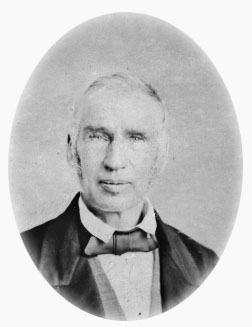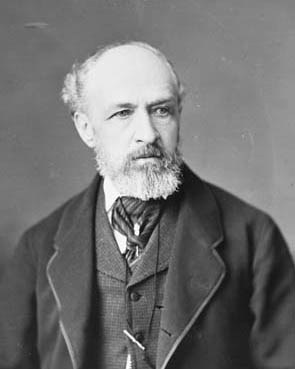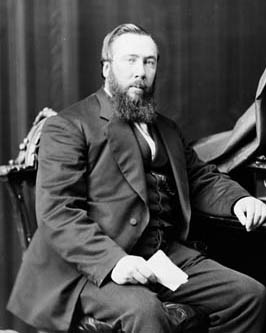1870 PARLIAMENTARY REPORTER. 231
Tuesday, April 12.
234
PARLIAMENTARY REPORTER. 1870
Confederation.
The House again in committee on the Despatches.
Mr. KICKHAM said he had some conversation on the subject of confederation with Hon. Mr. Tilley
last summer. His opinions on the question were the same then as they are now. He told
that hon. gentleman that he (Mr. K.) could not go for confederation without the
consent of his constituents, Mr. Tilley said, he (Mr. K.) might call his constituents
together; but he replied that many of them were out fishing. He (Mr. K.) was opposed
to confederation, unless the people desired it, and that being his view of the question,
he would not take up the time of the committee, as there were others who liked to
hear themselves speaking. (Laughter.)
Mr. ARSENAULT.—The beauties of confederation had been so well pictured, that there was scarcely
anything left for him to say. He would not undertake to shew its benefits or disadvantages,
at such length as some hon. members. If admitting the principle of confederation was
sufficient to set one down as a unionist, he believed he might be called one. He thought,
however, that he was in good company, for he considered there were very few in this
House who had not admitted the principle. He had not said that he was anxious to see
the union consummated; but he believed that it would some day take place. It was the
policy of the Home Government, and he believed that something would be done to induce
us to go into it. We had not heard many hon. members say that they would go for no
terms at all. Only two or three had openly said so in this House, and that showed
that the others believed union would take place at some future day. To hear some persons
speaking, you would think this Island was a very garden of Eden—that we had all we
desired, and all we could wish to have. He (Mr. A.) could not say that. It was not
long ago since there was anything but peace and contentment on the Island; he referred
to the time of the Tenant League agitation. The land question had been a bone of contention
for the last fifty years, and a steppingstone for politicians to get into places of
honor. When the better terms were first proposed, he (Mr. A.) thought that if they
were carried out faithfully, they would benefit the Island with respect to this question,
and he thought so still. Some had had an opportunity to purchase their lands; but
others were not able to pay for them, and, in the case of not a few of these, it was
because they had not had advantages. It was said, he believed, by the hon. member
for Alberton, (Mr. Bell) that the people were contented and happy. This might be the
case with some, but not with all. Where there were fishing stations, the people were
no better off than at other
1870 PARLIAMENTARY REPORTER. 235
places, for fishermen neglected their farms, and those who supplied them became the
proprietors of their farms. Such was the state of affairs in almost all fishing countries.
He had no objection to the minute of Council, which made the land question, the main
obstacle
in the way of accepting the better terms;
and therefore would agree to the resolution introduced by the hon. leader at the
government in this House. He knew
there was much truth in the saying, that
we might not feel the loss of our privileges until they were no, consequently
he believed it was right to deal cautiously in treating of this question. At the same
time, he was not a no-terms man ; he was in favor of the principle of union. He would
support the resolution to which he had already referred; but he would not pledge himself
to support any other, for he believed there were many resolutions yet to be proposed.
Mr. BELL would reiterate what he had
stated, that the people here were contented and happy. Any person in this Island,
who would work, need not be in want. It was a country for the poor man. Every day
brought out facts to show that we were better off as we were, than by going into confederation.
The Finance Minister of the Dominion had just introduced into parliament a measure
for issuing a large quantity of irredeemable paper, and a country that had to resort
to such means, to keep up its credit, could not be prosperous. Why did not the hon.
member, from Egmont Bay, refer to the case of Cape Breton? (Mr. B.) saw a man from
that island who said it had never recovered from the effects of its union with Nova
Scotia. Scarcely any outlying portion of a country prospered. Why could we not be
left here to collect our own revenues, as well as the Isle of Man, which was so near
Britain herself?
Hon. COL. SECRETARY agreed with most of the remarks that had fallen from the last speaker. Poor people
could not expect that they would gain anything by union. Persons in high positions
might receive a benefit by getting good offices. If the advantages which we possessed,
as a separate colony, were taken away, we would know, when perhaps too late, what
we had lost. Any man here, who was industrious and careful, might become independent.
The policy of the government on this question had been attacked, but if it was reviewed
from
first to last, it would be found that they
had taken a straightforward course. They had never sought an intercourse with the
Canadian government, and when the delegates came here, we treated them with the respect
to which they were entitled. They endeavored to ascertain why it was that we would
not go into confederation. They were told that it was doubtful whether any terms would
be acceptable until the land question was settled. It had been said that the government
looked upon receiving compensation for the loss of territorial revenues as a mere
parliamentary matter; but we told the delegates that it was doubtful, even though
that question was settled, whether we should go into confederation. To show that he
(Col. Sec.) was not in error, take up the proposals of the 14th December, transmitted
by Sir John Young. In them his government admitted that the loss of our lands was
a real grievance, and promised that they would endeavor to get redress from the Imperial
government. And they said that failing to get justice from Great Britain, the Dominion
government would give $800,000 towards settling these claims. When these proposals
came down, he (Col. Sec.) saw that a great admission had been made by the Canadian
government, but he had no idea that the answer given to them by the government here,
as contained in the minute of Council, would have so soon received a reply from the
Colonial Minister, who had put his own construction on that minute. His Lordship said
that the terms were rejected by the government, because they did not include a settlement
of the land claims; but the truth was that we would have been free to have entered
confederation or not, though compensation had been given for these claims. Some hon.
members tried to make it appear that the government were in favor of union; the Colonial
Minister, however, said that they had
rejected the terms, how then could any one say that the minute of Council was favorable to
confederation? He (Col. Secy.) thought one of the great advantages which had been
gained by this correspondence, was that the Canadian government had acknowledged that
this Island was entitled to receive compensation for the loss of her crown lands.
The Home government, by the Colonial Minister's despatch, refused to grant this compensation,
and the government here, by the minute of Council, were tied to
236
PARLIAMENTARY REPORTER. 1870
the principle that they could not receive
compensation from the Dominion treasury. This was just the position in
which he (Col. Sec.) wished to be placed.
He now felt free to go for a no-terms
resolution: We had good encouragement
to believe that our affairs would be attended to by the Home Government
with as much alacrity as those of the
Dominion, from the readiness with which
they had complied with our request to
lower the postage to Britain.
DR. JENKINS said it should borne
in mind that this government had hinted
to the Home Government their intention
to demand from them compensation for
the loss of crown lands, previous to the
time when this celebrated Minute of
Council now under discussion, was
penned. Two years ago a delegation
had been sent to the Imperial Government to endeavor to get a guarantee for
a loan, which appeared to be a very
humble method of demanding compensation. The course the government had
taken had destroyed every chance of
getting anything from the British Government; but had they allowed the
Canadian Government to take this matter
up, something might have been done.
He (Dr. J.) believed this Minute of
Council was intended to take the place
of a, " no-terms" resolution, which the
government were afraid to adopt. It
was said that the last despatch received
from the Colonial Office had settled the
subject of confederation; but the government would find out pretty soon that
such was not the case. This despatch
was only a mild remonstrance, but
every word of it plainly signified that
we must go on with negotiations, and if
we stopped negotiating, he (Dr. J.)
believe we should soon hear something
hotter. He believed the Leader of the
Government (Hon. Mr. Haythorne) was
honest when he stated he would take
fair terms, and he (Dr. J.) was proud
that he took the same ground on this
subject. The question of, a railroad had
been brought up in this discussion,
and he (Dr. J.) had been the first to
bring that matter to the notice of the
House, and he hoped to see the iron
horse traversing our Island before many
years. A railroad was indispensable to
develop the resources of the country,
as our roads were absolutely impassable
at certain seasons of the year, and at the
rate they were being macadamized we
would be all in our graves before even a
few miles in the vicinity cf the towns
would be covered with stone. The
harbors at the eastern end of the island
were open later in autumn than those
in other parts of the Island and had we
a railroad, farmers would be able to
ship their produce late in the season, and
would not be obliged to kill their horses
hauling heavy loads over very bad
roads. There was also a great deal of
timber in thewestern part of the Island
that would furnish work for a railroad
to transport it to Charlottetown. He
(Dr. J.) did not think the government
were on the fence, but behind it, and at
next election they would find a fence a
very poor shelter.
Hon. Mr. HAVILAND wished to reply
to a few remarks made by the hon member from Alberton (Mr. Bell) who stated
that the outlying portions of a country
never prospered: but if that hon member would go to the United States, he
would find that California, which was
an outlying State, had progressed as
rapidly as many of the States nearer
the seat of government. Then again he
(Mr. Bell) said we should be left like
the Isle of Man, which paid no duties to
the British Government; but he was
mistaken, for the revenues of the Isle of
Man were collected by the Imperial
Government.
Mr. BELL said the revenue of the Isle
of Man was not collected by the British
Government.
Hon. Mr. HAVILAND said a long time
ago the people of the Isle of Man collected their own revenue, but it became
such a nest of smugglers that the Imperial Government had to take it under
their protection. The Col. Secretary
had stated that our affairs were attended
to with as much alacrity as the aflairs of
the Dominion by the British Government.
Hon Mr. HAVILAND said he (Col.
Secretary) pretended to prove it by reference to the change made in the postal
department; but the truth was, the
British Government passed a law to
have letters going to the Dominion
charged only three pence postage, and
we were so insignificant they forgot to
include this Island in the arrangement,
and, through the neglect of the government to look after it, we had to pay the
old rate of postage six months longer
than the Dominion. 1t appeard that
the Col. Secretary did not know much
1870 PARLIAMENTARY REPORTER. 237
about the postal laws, for a government
resolution was introduced this session to make packages and parcels, passing through
the Post Office, liable to be seized by the Collector of Customs, and the Col. Secretary
quoted some old law, as old as Responsible Government, to prove that such parcels
should be detained, and he appeared totally ignorant of the new law on the subject.
He (Col. Sec.) also seemed to know nothing of the despatches laid on the table by
the government, for among them there was one stating that under Imperial rule samples
of merchandise should be sent from England by post, and asking this Island to reciprocate,
and nothing had yet been said on the subject.
Hon. Mr. HOWLAN said the subject to which that despatch alluded would be brought up in the proper
time.
Hon. Mr. HAVILAND said the government had never said anything about these despatches, and if hon members
had not taken the trouble of examining them, they would never have known they existed.
He (Mr. H.) believed the government were so inflated with the Minute of Council that
if the House was not providentially prorogues within a week they would burst. There
was also a despatch relating to the Governor's Salary Bill, which the British Government
wished to be amended, but nothing had been said about it. There was also a despatch
stating that Governors of Colonies, when they hoisted the national flag on joyful
occasions, should have a badge on it; but our government had done nothing in the matter.
Perhaps they thought we were going into confederation, and we should have the
Dominion beaver and maple leaves for
our Colonial Arms. There were several
of those despatches which required
legislation, an although the session was
nearly ended, nothing had been done.
The hon. Col. Secretary thought the
land question was now forever settled
by the last despatch from Lord Granville, and if so, his (Col. Sec's.) political
stock in trade was lost. He (Mr. B.)
supposed, after that declaration from the
Col . Secretary, that we should hear no
more of the wrongs of the tenantry; but
landlord and tenant would smoke the
pipe of peace together like brothers.
The Col. Secretary had changed his
opinions on confederation since he spoke
a few evenings since; then he was in a
spirit to please the Imperial Government
and the Dominion Government, and
warned the hon. member from Tryon
against a "no-terms" resolution, lest, if it were passed, Lord Granville should coerce
us into union ; but now he (Col. Sec.) appeared to be in favor of a "no- terms" resolution.
The Col. Secretary had also given the House a great definition of the work "reject,"
which was in the despatch, but unfortunately he stopped at that word.
Hon. Mr. HOWLAN said the Leader of
the Opposition had, all the afternoon, been into the despatches like a horse poking
his head into hay, and now it appeared he had found a "mare's nest." He (Leader of
the Opposition) appeared like a bottle of ginger beer - he went off with a pop - he
had travelled out of the record, but he would have to keep calm and bottle up his
effervescence, and patiently wait until these despatches were brought up in regular
order. One would have thought, from the discussion about Post Offices, that he (Leader
of the Opposition) knew something about them, but it appeared there were some things
he could not understand. the question discussed in committee of way and means was
regarding the sending of jewelry through the Post Office, and this despatch related
to books and pamphlets.
The Leader of the Opposition would try
to make the House believe that the government were remiss in their duty in not sooner
getting a reduction of letter postage between this Island and England ;
but as soon as they found out, that an
arrangement was made with the Do-.
minion, they applied to the British Government to have the same beneflts extended
to us, and our postage would be
uniform with that of the Dominion
in June next. It was impossible for the
government to know what correspondence was taking place between the
Postmaster General of the Dominion
and the Postmaster General of England.
As regarded the badge for our flag, the
government had acted upon the despatch; but this was not the proper time
to discuss these matters, as confederation
was the subject before the House.
Mr. REILLY thought if the minute of
Council had the effect some hon. members attributed to it, it was a master
stroke of policy on the part of the government to have drawn up such a document, inasmuch
as it had been the means
of placing the colony in a position which
left the people entirely free in the
238
PARLIAMENTARY REPORTER. 1870
matter. The people know also that the
government had been true to their
pledge; and when the document which
they drew up had been compared to what was worthy of a Machiavelli, or a Talleyrand,
he did not think they had any
cause to be ashamed of it.
Mr. BRECKEN said, judging from what
the hon. member for St. Peter's said,
he gloried in a Machiavellian policy on the
part of the government, in producing
a document which did not mean what
it wast intended to convey to the mind of
those who read it. Glorying that his
party was so wise as to be able to deceive the Home Government. Such a
policy was indeed worthy of a Machiavelli.
He (Mr. B.) looked upon such a course,
to be as stupid as it was dishonest. A
Machiavellian policy was that of duplicity
and hypocrisy, and yet it was the policy
Her most gracious Majesty's Queen's
Printer thought so clever.
Mr. REILLY considered the policy that
was adopted, the very best which, under
the circumstances, the government could
have pursued. And though the hon.
member (Mr. B.) might call the government what he pleased, yet he could
not show that they had proved untrue
to the promises made, or to the general
interests of those who sent them there.
By the course pursued, the onus of responsibility had been glued upon the
Home government, and, as to the despatch, it showed clearly that the Imperial
Government cared very little whether this
Island united with Canada or not.
Hon. Mr. DUNCAN thought the anti-
confederate party was likely to have
even the strongest of those who once
opposed them on their side, and the
arguments used a few days ago, by his
hon. colleague, were correct, the Island
now belonged to the people, and he was
pleased to see how many who once
opposed his (Mr. Duncan's) views, were
now coming to see the matter as he did.
It had been asked where would they go
to get money to buy out the lands of the
proprietors. Borrow it in England, was
the answer, and all knew the result.
He would, however, inform the
committee that there was then in the Union
Bank:—
| Deposits on call |
£15,331 19 2 |
| Treasury credit, |
14,464 0 0 |
| Deposits on interest, |
9,778 18 0 |
| Total in Union Bank, |
£89,564 17 2 |
BANK OF P. E. ISLAND.
| Deposits on call, |
£17,158 2 3 |
|
| Treasury credit, |
10,778 18 1 |
|
| Deposits on interest, |
31,048 11 3 |
—58,985 11 1 |
| Making a total of |
|
£98,550 3 9 |
The greater portion of this amount was
waiting investment when a larger interest could be obtained than the Banks would give.
He had made a similar statement at the time the Loan Bill was passing through the
House, and thought now if the government wanted to borrow money, they knew where to
look for it with a better prospect of success than when they sent to England for it.
After a few remarks from two or three
other hon members, the debate was adjourned.


 Cet individu a participé aux :
Cet individu a participé aux :
 Cet individu a participé aux :
Cet individu a participé aux :
 Cet individu a participé aux :
Cet individu a participé aux :


 Cet individu a participé aux :
Cet individu a participé aux :

 Cet individu a participé aux :
Cet individu a participé aux :
 Cet individu a participé aux :
Cet individu a participé aux :